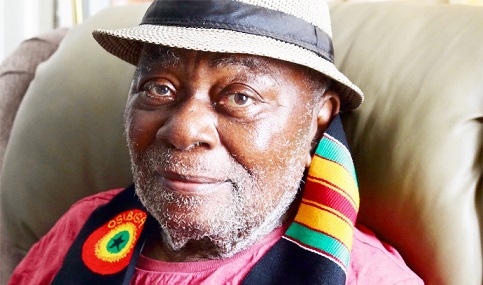The global music community is mourning the loss of Teddy Osei, the legendary saxophonist and co-founder of the iconic Afro-rock band, Osibisa. Teddy passed away on Tuesday, January 14, 2025, in London, UK, at the age of 88. His death marks a poignant moment, as he becomes the fifth original member of Osibisa to pass on, following Mac Tontoh (trumpet, horns, percussion), Sol Amarfio (drums, percussion), Spartacus R. (bass, percussion, vocals), and Abdul Lasisi Amao (flute, vocals, percussion).
The surviving original members of the groundbreaking band are Wendell Richardson (guitars, lead vocals, percussion) and Robert Bailey (keyboards, percussion).
Teddy Osei’s passing is a significant loss to the music industry, with colleagues and admirers paying heartfelt tributes to his extraordinary talent and immense contribution to African and global music. His vision and artistry shaped Osibisa’s distinctive sound, blending traditional African rhythms with elements of jazz, rock, and funk—a style famously known as “criss-cross rhythms.”

Tributes to a Visionary
Bessa Simons, President of the Musicians Union of Ghana (MUSIGA), described Teddy Osei as a visionary who left an indelible mark on the global music scene. Speaking to Graphic Showbiz, Bessa highlighted Osei’s role in Osibisa’s numerous hit songs and his influence on countless young musicians.
“Teddy Osei’s legacy spans over five decades, during which he redefined the music industry with his unparalleled skills as a saxophonist, flautist, and arranger. His work has left a lasting imprint on Ghanaian music, with Osibisa’s influence evident in nearly every aspect of the country’s musical landscape,” he said.
Bessa also expressed gratitude for Osei’s dedication to mentoring younger musicians, even in his later years. “Though he lived in the UK, he regularly returned to Ghana to share his knowledge and groom new talent, continuing to inspire us until health challenges slowed him down three years ago,” he added.
Memories from Industry Colleagues
Fred Kyei Mensah, known as Fredyyma, shared his fond memories of working closely with Teddy Osei during Osibisa’s performances in Ghana. Recalling a 2010 show at +233 Jazz and Grill Bar in Accra, Fredyyma described Osei’s stage presence and mastery of wind instruments as unforgettable.
“Teddy brought a unique energy to the stage. Watching him play the saxophone and flute was a truly memorable experience,” he said.
Paa Kwesi Holdbrook-Smith, who once managed Osibisa, hailed Teddy Osei as exceptional. “His versatility with the saxophone, flute, and fontonfrom made him stand out as a peerless talent. Teddy’s leadership and contributions have cemented Osibisa’s place in the history of popular music,” he said.
The Legacy of Osibisa
Founded in 1969 in the United Kingdom, Osibisa became the first African band to achieve global success with a series of chart-topping singles and albums. Their infectious fusion of African rhythms and Western influences gained international acclaim, earning them a reputation as trailblazers of Afro-rock. The band’s original lineup included three Ghanaian musicians—Teddy Osei, Sol Amarfio, and Mac Tontoh—alongside Wendell Richardson, Spartacus R., Robert Bailey, and Nigerian Abdul Loughty Lasisi Amao.
In 2019, Osibisa celebrated its 50th anniversary, with events in Accra organized by Scratch Studios in collaboration with MUSIGA. The milestone underscored the enduring impact of the band’s music and Teddy Osei’s pivotal role in its legacy.
Early Life and Career
Born in Kumasi in 1937, Teddy Osei’s musical journey began at an early age. He developed a passion for the saxophone during his school years in Sekondi, later forming his first band, The Comets. Following a brief stint as a building inspector, Osei received a scholarship from the Ghanaian government to study music and drama in London in 1962. It was during his time in London that he co-founded Osibisa, laying the foundation for a global music phenomenon.
A Lasting Impact
Teddy Osei’s contributions extend beyond music, embodying the cultural richness of Ghana and Africa as a whole. Through his work with Osibisa, he inspired generations of musicians and brought African rhythms to the global stage. His passing leaves a void, but his legacy will continue to resonate in the hearts of fans and musicians worldwide.

